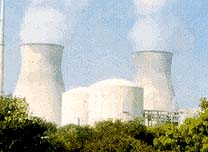| . |  |
. |
Tokyo (AFP) July 16, 2009 The next head of the UN atomic watchdog said Thursday that the cases of Iran and North Korea were "very different" because Tehran has not withdrawn from the Non-Proliferation Treaty. Iran also accepts UN inspectors at its nuclear facilities, said Yukiya Amano, a Japanese diplomat who was chosen earlier this month as the next director-general of the International Atomic Energy Agency (IAEA). North Korea quit the treaty to limit the spread of atomic weapons in 2003. "The nuclear issue of North Korea is very different from that of Iran," Amano said. "Iran's problem is that it has conducted nuclear activities without reporting them to the IAEA in the past two decades," The IAEA has been investigating Iran's controversial nuclear programme for the past six years, but has so far been unable to establish whether the activities are entirely peaceful as Tehran claims. Iran is defying the UN Security Council and amassing low-enriched uranium which the United States and its allies fear could play a crucial role in building a nuclear weapon. The agency's current chief, Egyptian-born Mohamed ElBaradei, has frequently been criticised, particularly by the United States and some of its Western allies, for being too lenient with Iran and for politicising the agency. He won the Nobel Peace Prize in 2005 for his work at the IAEA, Amano also said he wanted North Korea to rejoin six-nation disarmament talks and allow the return of UN nuclear inspectors. The talks, which involve the United States, China, Japan, Russia and the two Koreas, are on the brink of collapse, with the North boycotting the process since the United Nations condemned its long-range rocket launch in April. North Korea ordered the UN inspectors to leave the same month and announced it would resume its nuclear weapons program. On May 25 it announced it had conducted a second nuclear test.
earlier related report Japan adopted a "three non-nuclear principles" policy of not possessing or producing nuclear weapons or allowing them on its territory in 1968, and it regularly speaks out in favour of a nuclear-weapons-free world. "Tokyo and Washington will thoroughly discuss the issue if we take the reins of government," Yukio Hatoyama, the leader of the main opposition Democratic Party of Japan (DPJ), was quoted by the Japan Times as saying. "It is most desirable to openly abide by the three non-nuclear principles," added Hatoyama, whose party is hoping to clinch power in a general election next month. The issue is sensitive in Japan, the only country to have suffered nuclear attacks when bombed by the United States towards the end of World War II. The Mainichi Shimbun daily reported last month that a pact allowing visits by nuclear-armed US ships existed, quoting Ryohei Murata, a former vice foreign minister who served in the late 1980s. It said the accord was reached when Japan and the United States revised their security treaty in 1960 to give a more equal footing to Japan, which was rebuilding itself from the devastation of World War II. Japan's government has always denied there was such a pact. In 1991 US president George H.W. Bush announced that US vessels would no longer carry tactical nuclear weapons, rendering any such pact with Japan obsolete. A ruling party lawmaker, Taro Kono, told AFP he believes it existed, noting that official US documents and former US ambassador to Japan Edwin O. Reischauer had referred to the agreement. "It is only the Japanese government that is still denying it," he said. "We need some kind of nuclear strategy against North Korea. As long as the Japanese government lies to the people, it is very difficult to debate," said Kono, chairman of the lower house foreign affairs committee. Voter surveys suggest the DPJ is likely to win the general election -- which Aso has called for August 30 -- ending more than half a century of almost unbroken rule by the LDP. Share This Article With Planet Earth
Related Links Learn about nuclear weapons doctrine and defense at SpaceWar.com Learn about missile defense at SpaceWar.com All about missiles at SpaceWar.com Learn about the Superpowers of the 21st Century at SpaceWar.com
 US hopes India to reveal location for nuclear plants
US hopes India to reveal location for nuclear plantsWashington (AFP) July 15, 2009 The United States hoped Wednesday that India will soon announce the location of two sites for US firms to build multi-billion dollar nuclear power plants, in line with a landmark deal struck last year. The announcement could be made when US Secretary of State Hillary Clinton visits Mumbai and New Delhi from Friday through Monday, according to Robert Blake, her pointman for relations with Ind ... read more |
|
| The content herein, unless otherwise known to be public domain, are Copyright 1995-2009 - SpaceDaily. AFP and UPI Wire Stories are copyright Agence France-Presse and United Press International. ESA Portal Reports are copyright European Space Agency. All NASA sourced material is public domain. Additional copyrights may apply in whole or part to other bona fide parties. Advertising does not imply endorsement,agreement or approval of any opinions, statements or information provided by SpaceDaily on any Web page published or hosted by SpaceDaily. Privacy Statement |